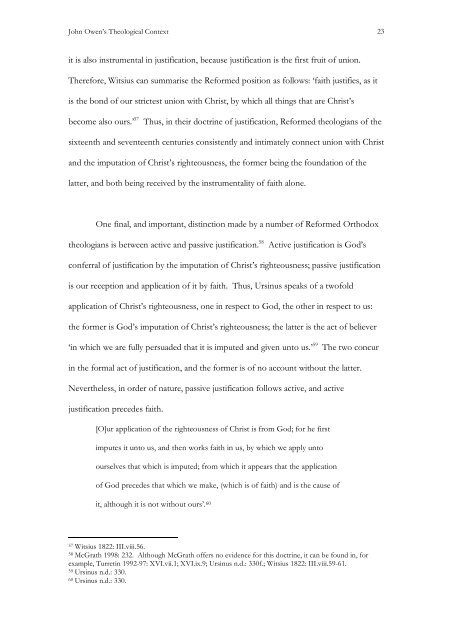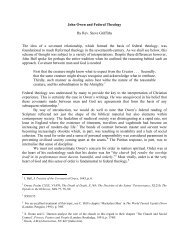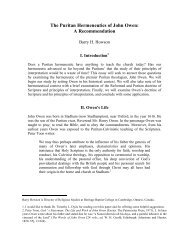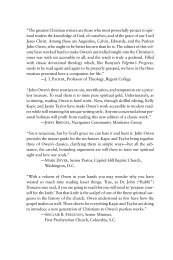M.TH. LONG DISSERTATION (LD6.1) - John Owen
M.TH. LONG DISSERTATION (LD6.1) - John Owen
M.TH. LONG DISSERTATION (LD6.1) - John Owen
Create successful ePaper yourself
Turn your PDF publications into a flip-book with our unique Google optimized e-Paper software.
<strong>John</strong> <strong>Owen</strong>’s Theological Context<br />
it is also instrumental in justification, because justification is the first fruit of union.<br />
Therefore, Witsius can summarise the Reformed position as follows: ‘faith justifies, as it<br />
is the bond of our strictest union with Christ, by which all things that are Christ’s<br />
become also ours.’ 57 Thus, in their doctrine of justification, Reformed theologians of the<br />
sixteenth and seventeenth centuries consistently and intimately connect union with Christ<br />
and the imputation of Christ’s righteousness, the former being the foundation of the<br />
latter, and both being received by the instrumentality of faith alone.<br />
One final, and important, distinction made by a number of Reformed Orthodox<br />
theologians is between active and passive justification. 58 Active justification is God’s<br />
conferral of justification by the imputation of Christ’s righteousness; passive justification<br />
is our reception and application of it by faith. Thus, Ursinus speaks of a twofold<br />
application of Christ’s righteousness, one in respect to God, the other in respect to us:<br />
the former is God’s imputation of Christ’s righteousness; the latter is the act of believer<br />
‘in which we are fully persuaded that it is imputed and given unto us.’ 59 The two concur<br />
in the formal act of justification, and the former is of no account without the latter.<br />
Nevertheless, in order of nature, passive justification follows active, and active<br />
justification precedes faith.<br />
[O]ur application of the righteousness of Christ is from God; for he first<br />
imputes it unto us, and then works faith in us, by which we apply unto<br />
ourselves that which is imputed; from which it appears that the application<br />
of God precedes that which we make, (which is of faith) and is the cause of<br />
it, although it is not without ours’. 60<br />
57 Witsius 1822: III.viii.56.<br />
58 McGrath 1998: 232. Although McGrath offers no evidence for this doctrine, it can be found in, for<br />
example, Turretin 1992-97: XVI.vii.1; XVI.ix.9; Ursinus n.d.: 330f.; Witsius 1822: III.viii.59-61.<br />
59 Ursinus n.d.: 330.<br />
60 Ursinus n.d.: 330.<br />
23





